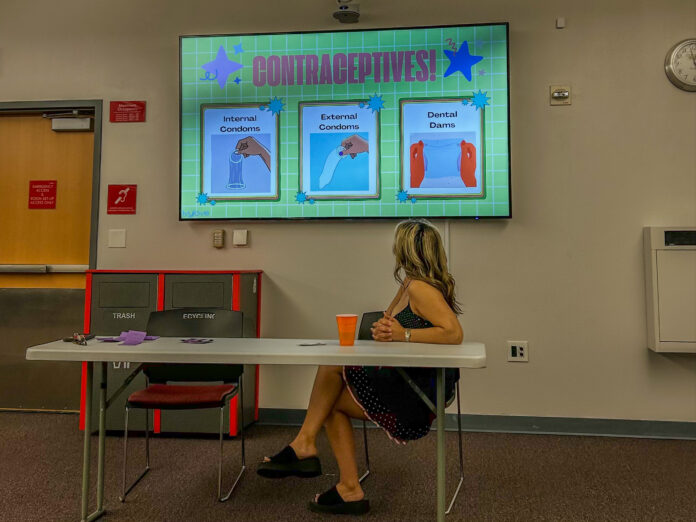
Bodies slick with sweat, lips locking in the heat of the moment, fumbling around with someone you have barely known for 25 minutes. These are well-known moments in the social whirl of college life, often hailed as the season for uncensored fun. Yet, this ‘fun’ can also lead to unexpected itching.
Despite one in four college students having a sexually transmitted infection (STI), the persistent stigma surrounding these conditions leads to a lack of understanding of how to address them effectively. As a society, we have remained ashamed instead of educated when it comes to discussions about healthy sexual practices.
On Thursday 17, Students United for Reproductive Justice (SURJ), a UNLV registered student organization, partnered with Planned Parenthood to host an event providing sex education. As UNLV students raced to slip a condom onto a fake penis, the stakes were high and the competition stiff. The reward? A delightful array of prizes: dildos, vibrators and even ‘Pocket Pussies.’
Unfortunately, these events aren’t always met with universal enthusiasm. “We have had a lot of faith-based groups that will come to our events and stand against them,” commented Ivy Love, SURJ’s vice president. “Some people don’t feel as appreciative about us sharing supplies, handing out Plan B or condoms.” Love pointed out that sexual health remains deeply stigmatized due to a lack of comprehensive sex education, which has led to SURJ facing criticism from certain quarters.
According to Planned Parenthood, society tends to categorize individuals into the “guilty” and the “innocent.” For instance, there’s often a tendency to stigmatize people with Gonorrhea, framing the infection as a deserved consequence for engaging in what are deemed as “wrong” sexual activities. Meanwhile, conditions like urinary tract infections often escape such scrutiny, despite both being treatable with antibiotics. This stigma persists due to the pervasive notion that sex, especially outside of traditional marriage or with multiple partners and genders, is inherently taboo and immoral. Consequently, any illnesses contracted through sexual activity are unfairly attributed to moral failings.
However, the harsh reality is that stigma and shame create a toxic environment for anyone who enjoys sexual activity. Research indicates that STI stigma and shame are significantly linked to a reduced willingness to inform non-primary partners about an STI and provide them with medication, as well as decreasing the likelihood of undergoing STI testing.
An alternative study suggests that fostering open dialogue that prioritizes sexual health and presents factual information can effectively combat stigma. By arming healthcare providers with the necessary tools to engage openly with patients, educational efforts can not only improve patient care but also diminish the stigma surrounding STIs.
At the end of the day, the most effective cure for STI stigma remains comprehensive sex education. It’s crucial for individuals to have the knowledge and resources to explore their sexuality safely and responsibly, without being turned off by the stigma associated with STIs.
